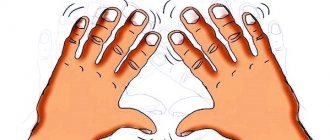Have you ever wanted to leave your job and find a better one? Dramatically change your life and choose something you like in another field? Or maybe you dreamed of taking a break from your studies and then finding something more worthy? The answer, most likely, will be positive, but only a few decide to do this.
Most people are held back by the fear of being unemployed and losing a bird in their hands while chasing a crane. According to scientists, the favorable economic situation in the country does not save us from it. And when the economy is limping, understandable and completely surmountable fear develops into a painful complex. Who is most likely to fall victim to fear of unemployment? This problem was studied by scientists from the Center for Labor Research.
We went through difficult times, when everything old collapsed, unsightly new things were created sluggishly, and troubles appeared in our lives, hitherto unknown. As research by sociologists has shown, in the late 80s and early 90s, “catastrophism” settled in our consciousness. This was expressed in the fact that people seriously expected the end of the world and were prepared for any disaster. Against the backdrop of other fears, the fear of being left without work grew. Meanwhile, the dire predictions did not come true. In 1992, unemployment was just over 5%, gradually increased towards the ill-fated 1998, peaked in early 1999, and then began to decline. The social disaster that was predicted did not happen, but we were mentally prepared for it. The result was a general fear of losing a job, which forced us to hold on tighter to any inferior position, endure harassment from superiors and not demand anything - as long as it didn’t get worse. As a consequence, low salaries in the labor market: why pay workers more if they are not going anywhere anyway.
As the authors of the work “Are Fear’s Eyes Big?” found out. - scientists Vladimir Gimpelson, Rostislav Kapelyushnikov and Tatyana Ratnikova, - such fear has an anatomical and social portrait. Thus, women are more afraid of unemployment than men. Moreover, the most sensitive category is from 40 to 59 years old. The farther from large cities, the lower the education, the stronger the fear. For the most part, employees, skilled industrial workers and ordinary workers are susceptible to it. By the way, the employer tends to aggravate the fear - the longer a person works for him, and the larger and more reputable the organization, the more employees are afraid of losing their jobs. It is curious that this phenomenon is more often observed in enterprises that are partially or completely state-owned.
As a result of the study, the authors put forward 3 hypotheses for the emergence of fears. In the first case, it depends on the level of real, rather than imaginary, unemployment. In the second, it depends on the experience, skills and education of the employee. And the third reason for this phobia is such characteristics of the enterprise as scale, age and form of ownership. Moreover, if the fear is extremely high, it creates a psychological trap - the person then cannot get rid of it for a very long time.
On the other hand, this fear has a beneficial effect on actual unemployment. After all, if a worker puts up with all the conditions set for him and ultimately remains employed, unemployment does not exceed a critical level. But, of course, this is of benefit only to the management of the enterprise, which spins the unresponsive employee as it pleases. Therefore, it is important to understand that fear is a lever that humiliates an employee in the eyes of the employer.
Lena Khemul
Nothing really changes - just your job status
If you get fired one day, will you become a different person? You are the same person, you have the same IQ, you are the same personality, you have the same friends. The only thing that has changed is your job status to temporarily unemployed. And what? The job can be replaced.
Use your precious energy to invest in your work, your passions. Fear and worry are a complete waste of time and simply drain your energy.
- 3 signs that you need to change jobs as soon as possible and how to do it
Start looking for a new job
Like any other phobia, the fear of losing a job is very difficult to explain logically. The fact is that he acts from the subconscious, directly relying on the instinct of self-preservation and survival. To remove fear or at least reduce it to an acceptable level, psychologists advise starting to look for a new job. Yes Yes exactly.
An excerpt from a lecture by psychologist Mikhail Labkovsky “How to stop worrying and start enjoying life”:
“If you are an employee, then you are kept at work for only one reason. Of the 100 rubles that you bring to your boss, you take only 5. As soon as you want 20, you will be fired...
...To leave a bad job, make an agreement with yourself, because everything is in your hands.
You will find yourself another job sooner or later, it’s a matter of time, but you must be prepared for it. But you cannot be prepared to constantly tolerate the unpleasant behavior of others. This increases your fears even more. The more you accept a situation that is killing you, the more you cultivate your anxieties.”
Of course, we are not asking you to quit right away. You just need to restore self-respect as a specialist and understand that losing your job is not the end of the world. In our world, in one or two months you can find a job in almost any field of activity if you are an experienced specialist.
Fear of losing employment
The fear of being unemployed arises when this is the only source of income. The mere thought that there is no cash in the wallet and the bank card is empty causes a person to panic. To make it less scary to lose your job, find an additional job. It may not be related to your main activity. If you lose your job, you will worry less, because you have an additional source of income.
A pessimistic attitude will not lead to anything good. There is no need to discuss the situation in the organization with colleagues and talk about your worries about possible dismissal. First, those employees who panic and thereby create a tense atmosphere in the team are laid off. Management is always aware of what subordinates are discussing during a break.
To avoid being fired, take advanced training courses or get an education in another field. The more you know and can do, the faster you can find a new place if the outcome is unfavorable.
Don't think negative thoughts. If you are nervous, mistakes in your work are inevitable. This is already grounds for dismissal. It happens that fear has no reason. A person simply constantly thinks about quitting and thereby attracts bad things.
A supernumerary vacancy may arise. Don't do more than you can. Everyone wants to please their boss, but don’t try to fulfill the monthly plan in two days. Don’t overwork yourself, because a manager needs healthy employees. If you give your all to one project, you are unlikely to be the best at the next. Fulfill your responsibilities, and there will simply be no time to think about bad things. Most people are scared by the thought of losing their job during a crisis. This plays into the hands of unscrupulous bosses. They reduce wages and burden employees with additional work. If a person is threatened by layoffs, it will happen soon and it’s time to look for a new place. If an employee is valued, they will not be told about dismissal, even as a joke.
Treatment
Naturally, at the first symptoms of peniaphobia, you should consult a psychotherapist or psychiatrist. They work in collaboration so that if necessary, they will refer to each other.
Recommendations to go to a psychiatrist should not be frightening. This does not mean that you will be locked in a clinic and abused, as shown in many films about insane asylums.
No, a consultation with a doctor is necessary so that he can prescribe accompanying medication.
That is, sedatives to relieve anxiety to eliminate panic attacks and help the nervous system relax.
If the lack of money frightens him so much that the phobe cannot sleep at all and is tormented by nightmares, he will prescribe sleeping pills.
Or antidepressants, if obsessive ideas about possible beggary have led to a state of apathy and lack of any desires other than to finally stop suffering and die.
It is also important to undergo therapy with a psychotherapist. After all, how to get rid of a phobia without understanding why it arose, what feelings were not expressed, and in general, where to start?
The most effective areas in this matter are Gestalt therapy, cognitive behavioral therapy and hypnosis.
If you are surrounded by a peniaphobe, do not rush to condemn him and demand that he be less greedy.
For him, losing money is commensurate with death and coping with this fear by willpower will not work. If only because he is not able to control himself and his feelings.
Tips to help you overcome the fear of losing your job
Tip 1. Assess the market for your profession as a whole
Even without quitting your job, you can view available vacancies on websites - it won’t take much time. To fully understand the situation on the labor market in your profession, you just need to spend a few evenings at the computer.
Often, an objective assessment of the market is hampered by downplaying one’s experience and skills in professional activities.
“Who will take me like that?” - thinks an accountant who served 10 years in a low-paying job in some government office.
A well-written resume, in which you methodically lay out all your professional successes, skills and capabilities, will help you get rid of underestimation. Even after 5 years of work in one field, any employee will be able to boast of a large pool of tasks and competencies that he can perform perfectly. And even an attempt to simply remember and list them will already raise your own value in your eyes.
Tip 2. Assess your knowledge, skills and abilities that are not part of your job responsibilities
Every person, without exception, has some set of skills and abilities. Most of them can be adapted to make money. Therefore, even if it happens that the entire industry in which you work collapses (which is extremely unlikely), your personal skills will still not allow you to starve.
For example, if you drive a car, you can earn extra money as a taxi driver. Not a dream job, but it will help you survive if you lose your main income. If you know how to knit well, you can sell handmade items. And there are plenty of similar options.
Understanding that you can earn money even in the event of not just losing your job, but a total collapse of the industry, will help you feel the fear of being fired much less acutely.
Example. Very often, employees are afraid of losing their jobs because they do not receive feedback from their management. They don't know whether they are doing their job well or just the opposite.
To avoid getting into a similar situation, back in 2013 we introduced a multi-level system of communication with our employees. Every week we have conversations with everyone, where we give full feedback on their work, advise on how to improve results, and celebrate successes.
This way we also monitor the mood of employees, we can promptly notice a drop in motivation and resolve the situation in a timely manner. It is thanks to this practice that turnover in the main staff of the company has decreased fourfold over five years.
Tip 3. Write down the pros and cons of your job
Trying to describe in detail all the advantages and disadvantages of your place of work will help you look at the situation from the outside. Just one table with two columns: pros and cons. And a few hours of pure time to think about the situation in detail.
The results may be very unexpected. After all, almost everything can be a disadvantage, except, in fact, the salary. The fear of losing such a job will decrease to zero and even more; you may want to quit it yourself.
Tip 4. Create a “safety cushion”
To reduce fear, we recommend creating a financial safety net - setting aside a certain amount of money on which you can live for 2-3 months in the absence of any income.
On average, searching for a new job takes up to a month, in rare cases - up to two, so such an emergency supply will allow you to find a new job without fear of going hungry. This way, you ensure financial security in the event of dismissal and remove subconscious reasons for being afraid of losing your job.
We prefer not to fight employee fears, but to prevent their occurrence. Each of our employees is confident in the stability of the company. They work not because they need to work somewhere, but because they love what they do and know that their work will be appreciated.
Even if conflicts arise, and in a human team there is no way without them, we try to resolve them in a civilized way, without threats of dismissal and other pressure. This is probably why the company has been growing rapidly and developing for many years now.
Symptoms
Behavioral
Peniaphobe is easily recognized by his unrealistic passion for money. He saves them so much that he doesn’t waste them at all. Despite the fact that it needs something.
The fear that poverty will one day overtake him is so great that it forces him to work day and night, without rest or entertainment. Accordingly, there can be no talk of any satisfaction with one’s stay on earth.
Subsequently, this lifestyle results in depression, nervous exhaustion, insomnia, and sometimes degradation. A person does not strive to develop, to get to know other people, something new, or himself, in the end.
Despite the fact that the phobe most often looks quite modest, he has good reserves for the so-called “rainy day”. Without them, he would have gone completely crazy.
Therefore, there can be no talk of any risky investments and unexpected expenses.
He does not trust banks and other financial institutions, preferring to keep his savings in different places, and even better, in hard currency.
Workaholism manifests itself only in the need to earn as much as possible. So the peniaphobe is quite lazy. He basically doesn't care what he looks like, how developed he is, and so on.
Attention is focused on the subject of fear, the rest is not bothered. Difficulties frighten him, he is not able to cope with them. Moreover, each problem threatens the integrity of such painstakingly accumulated wealth.
At times he resembles a person with schizophrenia. By the way, it is likely that this phobia is a consequence of the development of schizoaffective disorder.
That is, he suspects everyone, as if every acquaintance, or even relative, is literally dreaming and seeing how to take over his money.
The psychology of a peniaphobe is such that, fearing most of all being impoverished, he treats those in need of help with disgust.
Accordingly, he never even comes close to them and, despite requests, will not give a penny, either for food or for treatment.
Somatic
When thinking about poverty, the phobe begins to have a panic attack. It is characterized by high blood pressure and rapid heartbeat, which causes chest pain and difficulty breathing.
Such symptoms are even more frightening, because the phobe thinks that he is about to die from a heart attack or as a result of suffocation.
He sweats heavily, blushes and completely loses control over his behavior and thoughts.
Sometimes when a person panics, he feels nauseous, vomits, develops a nervous tic and his voice trembles. The gait becomes unsteady, all because of the tremors of the legs, he crashes into walls or stumbles, falls.
The face turns red at the moment of worry, the pupils “run” from side to side, since the peniaphobe is not able to concentrate on anything, he has only one thought in his head, and that is about how to preserve and protect his wealth in order to survive.
How fear of dismissal affects the work process
At first glance, it may seem that the fear of losing a job will motivate an employee to work better, thereby retaining his place even with general layoffs. But no, in fact, it's not like that. This is especially felt in companies that have been operating in the labor market for more than 15 years.
There is a pattern: the higher the fear of losing your job, the stronger the desire to please your boss appears. Essentially, the focus shifts from fulfilling your job responsibilities to fulfilling your boss's desires.
Fear makes you increasingly squeeze your needs just to stay at work and get paid. Even if in a competing company your work is valued 1.5-2 times higher. This gives management simply unimaginable leverage over the employee. A person who is afraid of losing his job can be forced to work after hours and on weekends, to do work outside of his direct duties. You can even lower your salary based on subjective performance or mistakes. Fearing losing his job, the employee independently gives maximum power over himself to his boss. Do you need it?
Example. A very instructive story happened to one of our employees. Mikhail worked as an English teacher in Tyumen for 10 years. We won’t announce the salary, but let’s say that it was slightly below the market average. But at the same time, the director constantly asked Mikhail to translate documents from and into English. As a result, the director saved a lot of money, and Mikhail often stayed late at work.
As Mikhail himself told us, for the last three years of this period he went to work as if it were hard labor. What I once loved brought only disappointment, but I was afraid to leave. My biggest fear was that I wouldn’t be able to find a new job.
I came to EnglishDom almost by accident - he was recommended by our employee as a good teacher. We invited Mikhail for an interview, he passed it successfully and, after some deliberation, decided to change jobs. Now Mikhail has been working with us as a tutor for three years. And for a year now he has been teaching classes from San Diego, USA.










